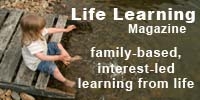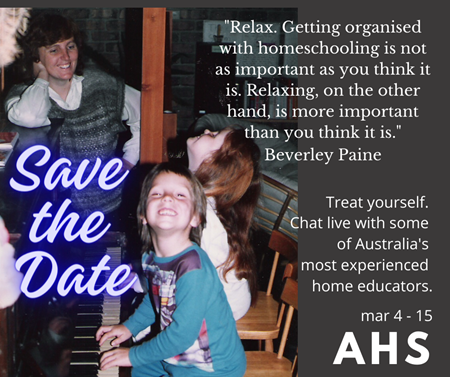|
Planning, Recording and Making Home Educating Life Easier for Ourselves
by Beverley Paine, Aut 2012
Last week Sharalyn, a mum on one of my support networks, commented that she initially felt bad about not stringently requiring her child to do school work at home. She discovered that her son seemed to "pick up a lot just by living it, being immersed in everyday life". This came about because they started doing a maths lesson (basically a mini-test to see what he actually knew and could do and to her surprise he knew far more than she realised, even though he hadn't been learning in the traditional school way. Sharalyn is now happy that her son "now learns in a way that suits his learning style". Bookwork and online lessons weren't for him: "he can and does pick up a lot more and faster than before". She no longer worries about him catching up to his schooled peers. This is how it happened for me too.
The first time I noticed it I was so surprised and I have to confess it took me years to learn to trust that my children could learn without being overtly taught. Now there are hundreds of thousands of families in Australia, the United Kingdom and the United States of America that echo this experience. Many of these families have grown children now home educating their children! But even with this knowledge and understanding, it is hard to go against what has been conditioned into us and to believe that learning in other ways does happen and happens brilliantly. Letting go of the one-size-fits-all curriculum approach to education is difficult because of this conditioning. It is thrown at us every day as the desired 'norm': the media (books, television, movies, internet) portray school as the only way for young people to become educated. And if you have teacher training, 'deschooling' can be especially challenging.
I love using books and textbooks and student workbooks as tools to achieve objectives, rather than as a total approach to education. We learn from life and life is busy and productive and constructive and active: there is a lot to learn from all that! When we need to learn something specific we find the best tool to help us do that.
I found recording our educational journey an essential tool and one that helped to build my confidence as a home educator. My records of what my children did and learned throughout each week demonstrated that it didn't really matter what approach we took they still learned so much. What's more they retained skills and information. This was another surprise, but when you think about it, because they weren't learning to pass a test or secure a grade, whatever they learned was of immense interest to them in the moment. And once a concept was learned it often didn't need any revision!
We used a mixed approach in the early years: school-at-home mingled with long wonderful days of unschooling. Eventually this translated into our ability to use whatever tools we could find that worked to learn whatever we needed, including using texts, work-books and courses. My deschooling journey was slow and gradual and in many ways experimental, responsive to the results of those experiments. I think this is a sensible way to begin home educating and helps to build security and confidence in learning from home.
Over time I developed recording methods that demonstrated to others that allowing children to learn naturally actually covered aspects of each curriculum area every week; see http://alwayslearningbooks.com.au/diarysamplepage.pdf . Although to onlookers my children seemed to 'play all day' and their learning appeared 'unstructured' our unschooling life wasn't unstructured at all. I had goals and plans and records which I maintained: that's my job as home educator. My children's job was to simply learn, which they did brilliantly.
Instead of planning ahead I opted to plan retrospectively. I would review my records of what my children had done and learned over the last couple of months and write it up as a plan. My natural learning diary helped to phrase everyday life as educational activities. I would record activities my children naturally chose to do on one page and those things I asked them to do on the facing page. Putting activities under headings helped me describe our natural learning life to fellow educators, especially for the purposes of obtaining approval to continue home educating. Doing this meant I didn't have to disrupt the wonderful spontaneity of learning or worry that if we didn't stick to the curriculum my children would miss out on some piece of so-called essential learning. Recording allowed me to see the diversity and range of what they were learning everyday and how comprehensive it actually was.
I would also collect 'samples' of specific learning outcomes for our annual review. Sometimes this meant jotting down on a piece of paper the objective and asking the child to add a comment or a drawing, especially if the learning occurred through conversation. I would then date it and then store it in my child's 'subject' folder. My children knew that I needed to keep some samples of learning for home education approval each year. I didn't pretend that it was necessary for education - I made it clear that we needed it to secure approval. Although as I later came to realise, recording was actually teaching my children many useful skills as well! At the end of the year we had enough samples to link together to show continuity of learning and that gave me the confidence I needed when talking to others.
A program is simply a plan and a plan is what you intend to do, not what is necessarily done. Builders start off with every intention of building according to the plan but if the plan doesn't work on that site or with the materials supplied, they change the plan. That happened with a house we had built: the roof needed to be removed because the plan hadn't taken something important into account and adjustments to the framing below needed to be made. When we design our early home educating plans we may not know our children's learning styles, needs and preferences. Plans need to have flexibility built in and created with a holistic or 'big picture' mental framework. And plans aren't 'set in concrete', they are tools, essentially maps to help us get to where we want to go.
It took my husband thirty years to realise that when I make plans I don't mean that we have to do exactly what I plan, that it's just an idea of what I'd like to happen, sometimes in a particular way, but that if circumstances change, then yeah, that will affect and change the plan. Goals and objectives are the same too. They aren't set in concrete; they are a bit like a 'wish list'. When we relax about deadlines and needing to stick religiously to our plans, when we start to de-school and realise that we have been trained to think in a particular way and that it is okay to change that to suit our needs, not the needs of others, home education becomes a lot more enjoyable.
See also Recording and Evaluation

Was this article helpful? Was it worth $1.00 to you?
Your gift of $1 or more helps to keep this site operating
offering encouragement
and reassurance to families
wanting
better outcomes for their children.



Beverley Paine with her children, and their home educated children, relaxing at home.
Together with the support of my family, my aim is to help parents educate their children in stress-free, nurturing environments. In addition to building and maintaing this website, I continue to create and manage local and national home educating networks, help to organise conferences and camps, as well as write for, edit and produce newsletters, resource directories and magazines. I am an active supporter of national, state, regional and local home education groups.
"You've been an inspiration to me, I love the way
you really listen to people." Vanessa
"Whenever I read your writing I always come away
with increased confidence in my ability to provide and
share a wonderful learning journey with my family!" Davina
"Your guidance, understanding, support and words of
wisdom changed our lives. We now offer support and
organise many homeschooling events for others." Lesley
"Thank you once again for your prompt and friendly service.
I am convinced that your books are going to add
quality and peace of mind to my journey of teaching my kids
at home! Just from studying your website, until almost
2am
in the morning, I 've been encouraged!" Louisa
"Thank you for all your many,many reassuring words
over many, many years. You probably don't know exactly how
valuable you are to the Australian Home Education community.
I've been reading your stuff for maybe 8 years or more now.
And I'm very grateful." Gythaa


CLICK HERE
if you want to learn
how to write your own education plans
to suit
your unique children's
individual learning needs?
Or you are looking for quality curriculum and teaching tips...
|
|
Welcome to the World of Home Education
and Learning without School!
We began educating our children in 1985, when our eldest was five. In truth, we had helped them learn what they need to learn since they were born. I am a passionate advocate of allowing children to learn unhindered by unnecessary stress and competition, meeting developmental needs in ways that suit their individual learning styles and preferences. Ours was a homeschooling, unschooling and natural learning family! There are hundreds of articles on this site to help you build confidence as a home educating family. We hope that your home educating adventure is as satisfying as ours was! Beverley Paine
3 ESSENTIAL STEP BY STEP GUIDES
Let experienced home educators Beverley, Tamara and April walk you through HOW to create a learning plan that builds on solid foundations that works for YOUR family AND ticks all the boxes for home educaton registration!
|

Tap into Beverley's
experience
through her books
"Your books, your blogs helped me beyond words... they helped me to find comfort in knowing it is ok to choose exactly what is best for my family." Nisha
"Your books and information are mind blowing and already I am feeling good about this new experience." Diane
"Your guidance, understanding, support & words of wisdom changed our lives." Leslie
"I feel specially inspired by Beverley's words and, the more I read her comments, the more inspired I feel, since my need for support, respect for different parenting styles, and information are fully met." Marijo
|
 |
|

The information on this website is of a general nature only and is not intended as personal or professional advice. This site merges and incorporates 'Homeschool Australia' and 'Unschool Australia'.
The Educating Parent acknowledges the Traditional Aboriginal and Torres Strait Islander Owners, the Custodians of Australia, and pay our respects to Elders past and present and extend that respect to Aboriginal and Torres Strait Islander people viewing this website.

Advertise on this site.













Australia's premier online annual conferences, lifetime access to video and audio recordings, freebies, notes and associated resource guides.
EVERY SUMMIT IS UNIQUE!
$29 each  2023 2023   2022 2022   2021 2021
$25 each  2020 2020  2019 2019   2017 2017
"Biggest and best Aussie homeschool event of the year!"

Home education is a legal alternative
to school education in Australia.
State and Territory governments are responsible
for regulating home education and have different
requirements, however home educating families
are able to develop curriculum and learning programs
to suit the individual needs of their children.

Without revenue from advertising
by educational suppliers and Google Ads
we could not continue to provide information
to home educators. Please support us by letting
our advertisers know that you found them on
The Educating Parent. Thanks!
|
![]() About
About
![]() Blog
Blog
![]() Articles
Articles
![]() Curriculum
Curriculum
![]() Resource Directory
Resource Directory
![]() Shop
Shop
![]() Kids Pages
Kids Pages
![]() Facebook
Facebook

![]() SA
SA ![]() VIC
VIC ![]() NSW
NSW ![]() QLD
QLD ![]() TAS
TAS ![]() ACT
ACT ![]() NT
NT ![]() NSW
NSW ![]() QLD
QLD ![]() SA
SA ![]() WA
WA ![]() TAS
TAS ![]() ACT
ACT ![]() NT
NT 





















